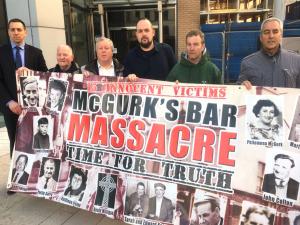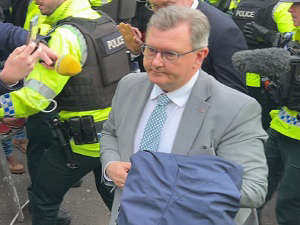
By Cate McCurry
A top officer in Ireland has suggested that police forces in the Republic and Northern Ireland are planning for a hard border in the wake of a no-deal Brexit.
Assistant Garda Commissioner Patrick Leahy and PSNI Assistant Chief Constable Alan Todd said they have been working together in an attempt to reduce the fallout of a chaotic Brexit.
Mr Todd appeared before Ireland's justice committee in Dublin for the first time alongside Mr Leahy in which they discussed the range of work both police forces have been putting in place.
They said that planning for Brexit has been a central focus during cross-border meetings between the PSNI and Garda Siochana.
It is only the second time a police officer from Northern Ireland has appeared before the Oireachtas sub-committee, following Sir Hugh Orde's visit in 2006.
Sinn Fein Senator Niall O'Donnghaile asked the top officers how damaging a hard border would be for cross-border corporation.
Mr Leahey responded: "We all know what could happen so we are planning for it, and in terms of resources and training we are looking at our infrastructure and what the implications will be.
"We are being mature about what is required around [Brexit] and we are waiting with baited breath as to where this takes us, but we are not sitting back and doing nothing."
Mr Todd told the committee it was difficult to plan without details of the outcome and final Brexit deal.
"We have been looking at the range of work we do on a cross-border basis and looking at which pieces rely on European regulations and trying to work out if we lost those how we would maintain what we have," he said.
While there is no Brexit withdrawal deal on the table, and with months to go before the UK leaves the European Union, there is a growing risk of a hard border.
Mr Todd said that the PSNI continues to face threats from dissident republicans and said he would be "nervous" of a return to infrastructure at the border.
He said: "We would be nervous about anything that could be used as focus to try and harness discontent and be used as some sort of quasi-legitimacy for their actions.
"It would make us uncomfortable at the notion that local community teams would want to enforce or be part of a border structure that didn't have approval of local communities."
It has also emerged that the Armed Response Unit in Northern Ireland, which was set up to deal with gun and knife crime, spends more than half its time in interventions with people suffering from mental health problems.
"That has been the saddest shift with which policing deals," he added.
Clare Daly Independents 4 Change TD described it as "mind blowing" and asked whether policing in the Republic was dealing with similar issues.
Mr Leahy told the committee that mental health is a factor in policing and the level of trauma officers deal with in the public is "becoming really topical".
"It wasn't something that was part of the discourse in policing five or 10 years ago, but it is very
much a part of that space now," he added.
He said the majority of people who are jailed have suffered trauma in their childhood.
"Mental health is becoming very much part of the lexicon in policing," he added.


 Swann refuses to rule out resigning if budget is not changed
Swann refuses to rule out resigning if budget is not changed
 Fresh inquests ordered into deaths of 15 killed in McGurk’s bomb blast
Fresh inquests ordered into deaths of 15 killed in McGurk’s bomb blast
 Trial ends after man accused of murder of young showjumper is found dead
Trial ends after man accused of murder of young showjumper is found dead
 A brief hearing and chaotic scenes as Donaldson makes first court appearance
A brief hearing and chaotic scenes as Donaldson makes first court appearance